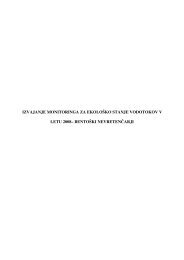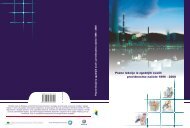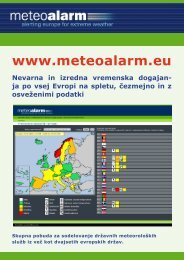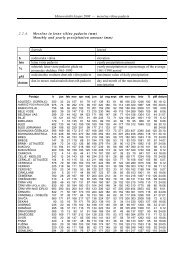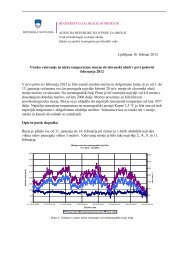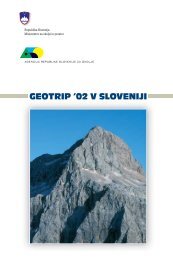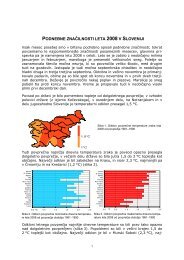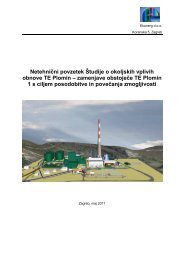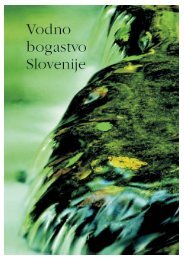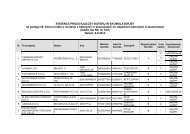Water Quality in Slovenia - Agencija RS za okolje
Water Quality in Slovenia - Agencija RS za okolje
Water Quality in Slovenia - Agencija RS za okolje
You also want an ePaper? Increase the reach of your titles
YUMPU automatically turns print PDFs into web optimized ePapers that Google loves.
Preface<br />
In recent years, people often ask about water quality. In most cases, they th<strong>in</strong>k of the taste, scent<br />
and look of water we dr<strong>in</strong>k every day. But the answer to the question “What is the quality of water?”<br />
is much more complex, s<strong>in</strong>ce water quality is not just the quality of dr<strong>in</strong>k<strong>in</strong>g water, and, moreover,<br />
water quality cannot be described merely by the words ‘good’ or ‘bad’.<br />
<strong>Water</strong> quality is a term used to describe the physical, chemical and biological characteristics of water,<br />
usually <strong>in</strong> respect to its suitability for a particular purpose. Different water characteristics are essential<br />
for different purposes. Industrial water, for example, must not be corrosive and must not conta<strong>in</strong><br />
substances that result <strong>in</strong> the formation of residue on the appliance surface. Dr<strong>in</strong>k<strong>in</strong>g water must not<br />
conta<strong>in</strong> any toxic substances and ha<strong>za</strong>rdous microorganisms. Furthermore, bath<strong>in</strong>g water must not<br />
conta<strong>in</strong> microorganisms either, s<strong>in</strong>ce they can cause numerous diseases. With the objective of water<br />
protection, various regulations prescrib<strong>in</strong>g the limit values of concentrations of various substances <strong>in</strong><br />
water have been issued <strong>in</strong> the last thirty years <strong>in</strong> Europe, as well at a national level.<br />
With the <strong>in</strong>tent of susta<strong>in</strong>able use, prevention of deterioration, protection and the improvement<br />
of the exist<strong>in</strong>g water status, reduction of ha<strong>za</strong>rdous substance pollution and provision of sufficient<br />
quality surface and groundwater supplies, <strong>in</strong> 2000 the European Union adopted the <strong>Water</strong> Framework<br />
Directive, which gives the Member States a legal and professional basis for an <strong>in</strong>tegrated approach to<br />
water protection and management. The ma<strong>in</strong> objective of the <strong>Water</strong> Framework Directive is to achieve<br />
a good chemical and ecological status of all waters by 2015. The <strong>Water</strong> Framework Directive does not<br />
prescribe limit values for <strong>in</strong>dividual water parameters; it provides a new approach to an <strong>in</strong>tegrated<br />
evaluation of both the chemical and ecological status of water. The new approach is based on the<br />
conditions of the aquatic environment where the impact of human activity is either not present or<br />
is <strong>in</strong>significant. This means that, accord<strong>in</strong>g to the requirements of the <strong>Water</strong> Framework Directive,<br />
water quality is evaluated comprehensively and the natural status is def<strong>in</strong>ed as a state without<br />
ha<strong>za</strong>rdous substances or other major loads, a state that supports the life of all aquatic organisms as it<br />
would be <strong>in</strong> the case of <strong>in</strong>significant human impact. At the same time, it provides a comparability of<br />
methodologies and standards and thus, for the first time, comparability of the assessments of water<br />
quality status among <strong>in</strong>dividual Member States.<br />
For the evaluation of water quality, the <strong>Water</strong> Framework Directive <strong>in</strong> Article 8 requests the<br />
<strong>in</strong>troduction of surface and groundwater monitor<strong>in</strong>g programmes. Monitor<strong>in</strong>g and water quality<br />
status evaluation is one of the key tasks of the Environmental Agency of the Republic of <strong>Slovenia</strong>. The<br />
monitor<strong>in</strong>g of water quality <strong>in</strong> <strong>Slovenia</strong> has a long tradition, but <strong>in</strong> 2007, it was carried out accord<strong>in</strong>g<br />
to the requirements of the <strong>Water</strong> Framework Directive for the first time. The first assessments of the<br />
chemical and ecological status <strong>in</strong> accordance with the requirements of the <strong>Water</strong> Framework Directive<br />
will, for the purpose of river bas<strong>in</strong> management plans, be carried out by 2009.<br />
The present publication is a brief overview of the water quality status <strong>in</strong> <strong>Slovenia</strong> and a trend evaluation<br />
<strong>in</strong> relation to the situation <strong>in</strong> previous years. The assessments have been made <strong>in</strong> accordance with the<br />
currently applicable regulations that have already been partially adapted to the requirements of the<br />
<strong>Water</strong> Framework Directive. With this publication, we wish to contribute to the understand<strong>in</strong>g of the<br />
water quality issue and to the conservation of our precious water resources for future generations.<br />
Silvo Žlebir, Ph.D.<br />
Director General of the Environmental Agency of the Republic of <strong>Slovenia</strong><br />
5



